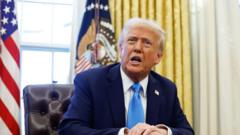President Trump has signed an executive order imposing sanctions on the International Criminal Court (ICC), a move that reinforces the U.S. stance against the court's jurisdiction and actions towards American and Israeli officials amidst ongoing war crimes allegations.
Trump Targets ICC with New Sanctions Ordered Against Investigative Actions

Trump Targets ICC with New Sanctions Ordered Against Investigative Actions
President Trump's executive order imposes strict sanctions on the International Criminal Court, exacerbating tensions related to U.S. and Israeli involvement in war crimes investigations.
In a controversial move, President Donald Trump signed an executive order imposing sanctions on the International Criminal Court (ICC) in response to what he described as the court's attacks on the United States and Israel. The executive order, announced by the White House, establishes financial and visa restrictions on individuals aiding the ICC in investigating American citizens or allies.
This action follows a vote from the U.S. House of Representatives earlier this year to sanction the ICC after the court issued arrest warrants for Israeli Prime Minister Benjamin Netanyahu and Defence Minister Yoav Gallant concerning accusations of war crimes related to the Gaza conflict, which Israel strongly refutes. The ICC also issued a warrant for a commander from Hamas, leading to further contentious debate over the court’s impartiality.
The White House's fact sheet outlining Trump's new order characterizes the ICC's actions as creating a "shameful moral equivalency" by treating Hamas and Israeli leaders with equal scrutiny. The document also argues that the ICC restricts Israel's right to self-defense while failing to hold Iran and other anti-Israel factions accountable.
Previously, during his first term, Trump took several significant actions against the ICC, including sanctions imposed on ICC officials investigating potential war crimes by U.S. forces in Afghanistan. The current executive order extends these sanctions, allowing the U.S. to block assets of ICC employees and deny them entry into the country.
In reaction to Trump’s new sanctions, the ICC condemned these moves as an "unacceptable attempt to interfere with the rule of law." Established in 2002 after significant humanitarian crises such as the Rwandan genocide and the dissolution of Yugoslavia, the ICC aims to address serious crimes, including war crimes and genocide. However, both the U.S. and Israel have not ratified the Rome Statute, which acts as the foundation for the court, making them outside of its jurisdiction.
Leaders such as Joe Biden have also criticized the ICC's warrants against Netanyahu and Gallant, labeling them as "outrageous" and denying any meaningful equivalence between Israeli and Hamas actions amid ongoing conflicts. The tension surrounding the ICC continues as the international community remains divided on the court’s role and authority in global justice.
This action follows a vote from the U.S. House of Representatives earlier this year to sanction the ICC after the court issued arrest warrants for Israeli Prime Minister Benjamin Netanyahu and Defence Minister Yoav Gallant concerning accusations of war crimes related to the Gaza conflict, which Israel strongly refutes. The ICC also issued a warrant for a commander from Hamas, leading to further contentious debate over the court’s impartiality.
The White House's fact sheet outlining Trump's new order characterizes the ICC's actions as creating a "shameful moral equivalency" by treating Hamas and Israeli leaders with equal scrutiny. The document also argues that the ICC restricts Israel's right to self-defense while failing to hold Iran and other anti-Israel factions accountable.
Previously, during his first term, Trump took several significant actions against the ICC, including sanctions imposed on ICC officials investigating potential war crimes by U.S. forces in Afghanistan. The current executive order extends these sanctions, allowing the U.S. to block assets of ICC employees and deny them entry into the country.
In reaction to Trump’s new sanctions, the ICC condemned these moves as an "unacceptable attempt to interfere with the rule of law." Established in 2002 after significant humanitarian crises such as the Rwandan genocide and the dissolution of Yugoslavia, the ICC aims to address serious crimes, including war crimes and genocide. However, both the U.S. and Israel have not ratified the Rome Statute, which acts as the foundation for the court, making them outside of its jurisdiction.
Leaders such as Joe Biden have also criticized the ICC's warrants against Netanyahu and Gallant, labeling them as "outrageous" and denying any meaningful equivalence between Israeli and Hamas actions amid ongoing conflicts. The tension surrounding the ICC continues as the international community remains divided on the court’s role and authority in global justice.






















